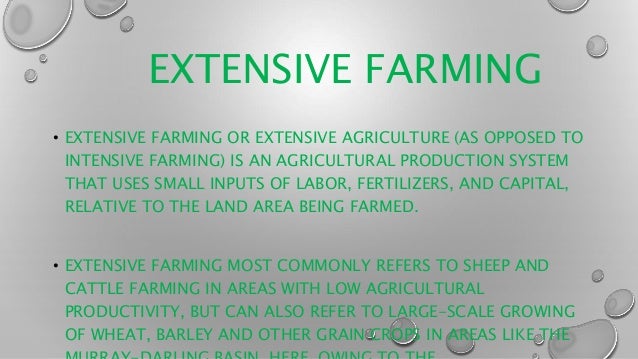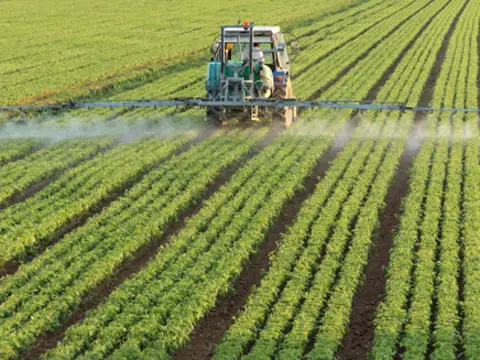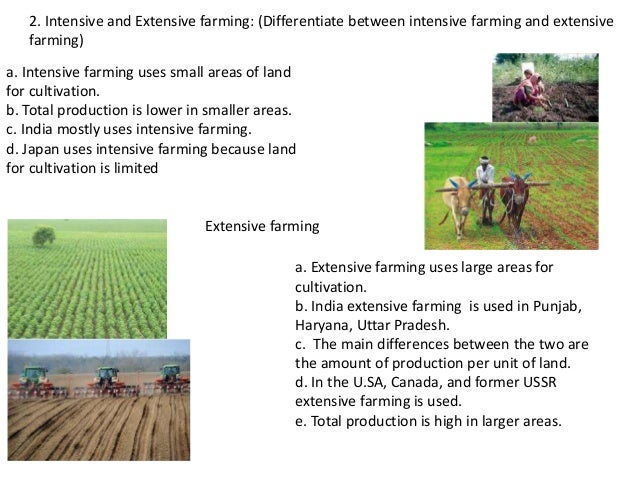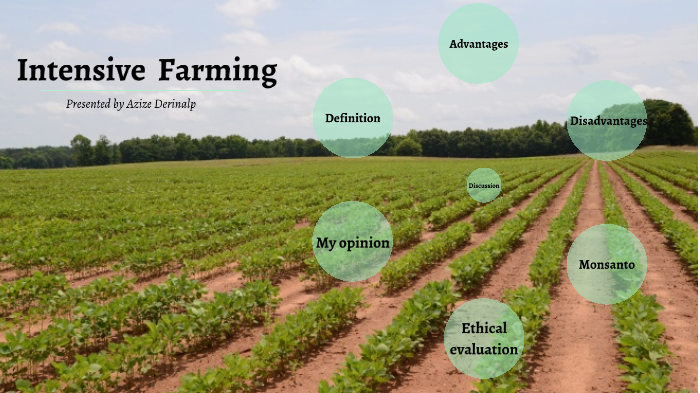Intensive Farming Definition
Intensive farming or intensive agriculture is an agricultural production system characterized by a low fallow ratio and the high use of inputs such as capital labour or heavy use of pesticides and chemical fertilizers relative to land area. Definition of Intensive FarmingIntensive farming refers to the intensification and mechanization of the agriculture with the objective of increasing the pro.

Intensive Farming And Extensive Farming
DAs are generally required for these industries so that potential impacts on the site and on adjoining land are managed and.

Intensive farming definition. Intensive farming or intensive agriculture is a kind of agriculture where a lot of money and labour are used to increase the yield that can be obtained per area of land. Intensive Horticulture means the growing of plants and fungi using the following horticultural systems. The use of intensive farming can damage the environment.
Intensive farming refers to the intensification and mechanization of the agriculture with the objective of increasing the productivity of a particular land. Large amounts of labour and capital are necessary to the application of fertilizer insecticides fungicides and herbicides to growing crops and capital is. The use of large amounts of pesticides for crops and of medication for animal stocks is common.
Intensive farming or intensive agriculture is a kind of agriculture where a lot of money and labour are used to increase the yield that can be obtained per area of land. Without restricting the generality of the foregoing this shall include a greenhouse or plant nursery but not confined feeding operations. In order to grow as many crops or keep as many animals as possible on the amount of land available.
ɪnˌtensɪv ˈfɑːmɪŋ us ɪnˌtensɪv ˈfɑːrmɪŋ a way of producing large amounts of crops by using chemicals and machines. Intensive agriculture means a commercial agricultural operation which raises crops on a land-intensive basis. Except where in the opinion of the Consent Authority the produce is grown for personal household consumption or enjoyment.
Intensive farming in British English. Intensive horticulture generally occurs in or close to metropolitan centres which provide access to. Intensive livestock agriculture includes industries such as poultry pig farms cattle and sheep feedlots dairies and rabbit farms.
Intensive farming can also mean keeping livestock in smaller pens with regulated temperatures. Farming that aims to produce as much as possible usually with the use of chemicals. This is in contrast to many sorts of traditional agriculture in which the inputs per unit land are lower.
Intensive farming also intensive agriculture is the practice where a lot of labor and capital is employed to maximize agricultural produce or yields. Hydroponics Artificial housing Crop protection structure Market gardening Orcharding and Field flowers. The potential environmental impact of large-scale intensive farming.
This is possible through the high-level use of inputs such as capital labour fertilizers insecticides pesticides weedicides etc which results in increased yield of the crop per hectare. This reduces the energy they need for movement and temperature regulation and so maximises their size. The use of chemical fertilizers and pesticides in intensive agriculture has dramatically increased crop yields.
Intensive horticulture1 is a premises that is used for the intensive production of plants or plant material on imported media and located within a building or structure or where outdoors artificial lights or containers are used. Intensive agriculture in agricultural economics system of cultivation using large amounts of labour and capital relative to land area. Also intensive farming farming that uses a lot of machinery labour chemicals etc.
Sample 1 Sample 2. It is characterized with the intensive use of pesticides fertilizer and other production inputs for crops and medication as well as concentrated feeding for the animal stock. Intensive activity involves concentrating a lot of effort or people on one particular task in order to try to achieve a great deal in a short time.
The use includes the storage and packing of produce and plants grown on the subject site. The use of large amounts of pesticides for crops and of medication for animal stocks is common. This is a contrast to traditional agriculture which does not get as much output per area.
Elsewhere large areas have been drained and levelled for industry or intensive farming.

Intensive Extensive Farming What Is Intensive Farming Intensive Farming Or Intensive Agriculture Is An Agricultural Production System Characterized Ppt Download

Sustainability Advantage High Yield Intensive Agriculture Outpaces Organic Farming Large Study Shows Genetic Literacy Project

The Pros And Cons Of Intensive Farming

Difference Between Intensive And Extensive Farming Farming Base

Advantages And Disadvantages Of Intensive Farming
Intensive Agriculture Cultural Anthropology

Types Of Farming Commercial Farming The Production Of Food For Sale Usually Large Tracts Of Land Capital Intensive Use Of Equipment Over People Ppt Download

Intensive Farming And Extensive Farming

Intensive Farming Facts For Kids

Intensive Farming And Extensive Farming Difference Between Extensive And Intensive Farming Youtube

Organic And Intensive Farming Ppt Video Online Download

Monoculture Do Intensive Farming And Gmos Really Threaten Biodiversity Genetic Literacy Project

Advantages And Disadvantages Of Intensive Farming

Intensive Farming By Azize Derinalp

What Is Non Organic Or Conventional Farming Earth S Insight

Intensive Extensive Farming What Is Intensive Farming Intensive Farming Or Intensive Agriculture Is An Agricultural Production System Characterized Ppt Download
The Difference Between Intensive And Extensive Canadian Agriculture

Soil The Foundation Of Agriculture Learn Science At Scitable

Post a Comment for "Intensive Farming Definition"